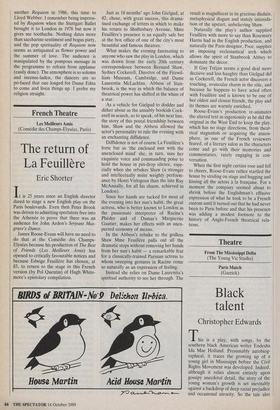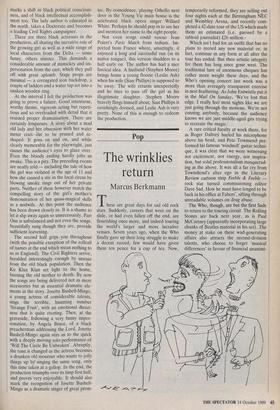Theatre
From The Mississippi Delta (The Young Vic Studio) Paris Match (Garrick)
Black talent
Christopher Edwards
This is a play, with songs, by the southern black American writer Endesha Ida Mae Holland. Presumably autobiog- raphical, it traces the growing up of a young girl in Mississippi before the Civil Rights Movement was developed. Indeed, although it relies almost entirely upon gossipy anecdotal detail, the story of the young woman's growth is set inevitably against a backdrop of deep racial prejudice and occasional atrocity. So the tale also
marks a shift in black political conscious- ness, and of black intellectual accomplish- ment too. The lady author is educated in the north, takes a Doctorate and becomes a leading Civil Rights campaigner.
There are three black actresses in the production, all sharing the narrative role of the growing girl as well as a wide range of local characters from the Delta — some funny, others sinister. This siemands a considerable amount of mimickry and im- personation from the cast; which they pull off with great aplomb. Stage props are minimal — a corrugated iron backdrop, a couple of ladders and a water tap set into a sunken wooden ring.
At the interval I felt the production was going to prove a failure. Good intentions, worthy theme, vigorous acting but repeti- tious and so overloaded with detail that it resisted proper dramatisation. There are certainly longueurs. A story about a mad old lady and her obsession with her water meter cries - oat to be pruned and re- shaped.. It gdes. on and on, and while clearly memorable for the playwright, just causes the audience's eyes to glaze over. Even the bloody ending hardly jolts us awake. This is, a pity. The preceding events are neatly told — including the tale of how the girl was violated at the age of 11 and how she caused a stir in the local circus by blowing smoke rings out of her private parts. Neither of these however match the compelling story of the girl's mother's demonstration of her quasi-magical skills as a midwife. At this point the audience has been drawn closely in. It is a shame to let it slip away again so unnecessarily. Part One is unbalanced and not even the songs, beautifully sung though they are, provide sufficient leavening.
The second half grips you throughout (with the possible exception of the rollcall of names at the end which mean nothing to us in England). The Civil Righters arrive, heralded interestingly enough by unease from the old black population. Then the Ku Klux Klan set light to the home, burning the old mother to death. By now the songs are being delivered not as mere accessories but as essential dramatic ele- ments in the story. _rosette Bushell-Mingo, a young actress of considerable talents, sings the terrible, haunting number `Strange Fruit', with an emotional direct- ness that is quite riveting. Then, at the graveside, following a very funny imper- sonation, by Angela Bruce, of a black preacherman addressing the Lord, Josette Bushell-Mingo again stirs us to the quick with a deeply moving solo performance of `Will The Circle Be Unbroken'. Abruptly, the tone is changed as the actress becomes a drunken old mourner who wants to jolly things up by singing the same song, only this time taken at a gallop. In the end, the production triumphs over its limp first half, and proves very enjoyable. It should also mark the recognition of Josette Bushell- Mingo as a dramatic singer of great prom-
ise. By coincidence, playing Othello next door in the Young Vic main house is the celebrated black opera singer Willard White. Perhaps he should pop in to see her and mention her name to the right people.
Not even songs could rescue Jean Poiret's Paris Match from tedium. Im- ported from France where, amazingly, it enjoyed a long and successful run (in its native tongue), this version shudders to a halt early on. The author has had a nice farcical idea. A husband (Stephen Moore) brings home a young floozie (Leslie Ash) when his wife (Sian Phillips) is supposed to be away. The wife returns unexpectedly and he tries to pass off the girl as his illegitimate daughter. Stephen Moore bravely flings himself about, Sian Phillips is ravishingly dressed, and Leslie Ash is very pretty. None of this is enough to redeem the production.



























































 Previous page
Previous page